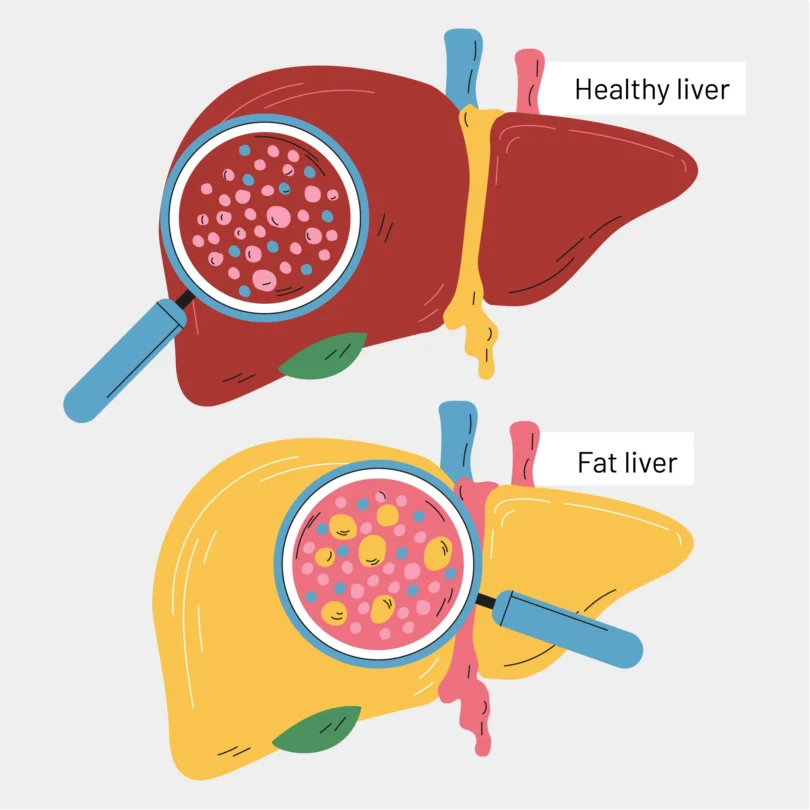If you are over 50 and your doctor uses the term MASLD you are not alone. This new medical term represents a new way to think about, and treat, fatty liver disease. The good news is that MASLD treatment has explored lots of different strategies for managing, and even reversing this new way of thinking about fatty liver disease. The newer MASLD treatment strategies combine proven lifestyle approaches with new medical therapies that address the underlying metabolic dysfunctions.
So let me take you through everything you need to know, in order to make effective MASLD treatment change your pathway to health.
What is MASLD ?
MASLD stands for metabolic dysfunction-associated steatotic liver disease – this is just the new name for what we used to call non-alcoholic fatty liver disease or NAFLD. It is described mainly as fat deposits in the liver and metabolic risk factors such as diabetes, high blood pressure, or being overweight or obese.
NAFLD VS MASLD
NAFLD (nonalcoholic fatty liver disease) and MASLD (metabolic dysfunction-associated steatotic liver disease) are terms that refer to the same underlying disease, the condition of fat accumulation within the liver regardless of alcohol involvement. MASLD is the updated name to emphasize the important role metabolic dysfunction (e.g., obesity, diabetes and other cardiometabolic risk factors) has in the development of the disease. Although NAFLD was diagnosed by exclusion (not due to alcohol intake or other known liver disease), MASLD requires liver fat plus at least one metabolic risk factor, which is an improvement by providing a more precise and less stigmatizing diagnosis. The change is also consistent with the language used clinically to describe the current scientific understanding of the disease as it provides direction on future research, treatment, and awareness of the metabolic drivers of the condition.
MASLD Symptoms
Symptoms of MASLD are often vague and can include chronic fatigue and weakness, discomfort in the abdominal region, weight loss or weight gain for no apparent reason and elevated liver enzymes from a lab test. The reality is that many people who are in the early stages of MASLD, aren’t presenting any symptoms, which is why it is critical to obtain regular health screenings.
As we are now two years into the increased awareness of MASLD, mainly because medical experts are finally recognizing that MASLD affects nearly 30% of adults worldwide, The effective MASLD treatment has never been more front and centre. This is alarming because with the reported prevalence of MASLD, awareness and MASLD treatment are now considered and identified as a public health issue.
The Importance of Diet in MASLD Treatment

Your liver processes everything you eat, making dietary decisions the most important variable in successfully treating MASLD. Numerous studies have shown that a Mediterranean diet is recommended for all individuals with MASLD, with greater emphasis on weight loss of 7-10% for people with excess weight. This is not just about losing weight, this is about changing the way your body processes nutrients and energy.
The metabolic dysfunction, together with the accumulation of fat in the liver, has created a vicious cycle that will wear down your health. When your metabolism cannot process sugars and fats adequately, your liver is used as a storage unit for energy that is not utilized. Eventually, this leads to inflammation and progression of liver damage, which can become irreversible if not treated.
Food that drives liver dysfunction includes processed foods high in trans fats, hyper-sweet beverages or refined carbohydrates, excessive levels of fructose from corn syrup, ultra-processed snacks and fast foods. These foods exceed your liver’s ability to process fats and sugars without issues.
Nutrition MASLD Guidelines
The primary clinical dietary strategies for MASLD (formerly known as NAFLD) are:
- Reduction in intake of 500-750 calories per day
- Increase in total fiber to 25-35 grams per day
- Preference to leaner proteins and healthier fats (ie, “good” fats; omega-3 fish options below)
- Restriction of added sugars to less than 10% of daily calories.
Following the PMC PubMed Central lifestyle intervention is the most effective approach for the management of patients with MASLD
Lifestyle Changes: Healthy Habits for MASLD Treatment

Making eating a part of your lifestyle and not a diet does not need to be perfect but needs to be consistent and understanding. Here is what treating MASLD successfully with dietary changes looks like in practice. An ideal macronutrient distribution would be 45-65% complex carbohydrates, 20-35% healthy fats and 10-35% lean protein.
Many anti-inflammatory foods lend themselves as valuable partners on your journey of recovery. Fatty fish such as salmon, mackerel, or sardines provide omega-3 fatty acids that counteract liver inflammation. Fresh leafy greens and colorful vegetables provide essential macronutrients and support detoxification. Berries and fruits rich in antioxidants counter oxidative stress; while healthy fats from nuts, seeds, or oils help support liver fat metabolism.
Fruits, vegetables and whole grains and foods high in fiber are critical to recovery from MASLD. Whole grains such as quinoa and brown rice can reduce blood glucose spikes. Foods high in legumes such as beans, lentils, and chickpeas contain fiber and protein in plant-based foods. Fresh fruits are better than their juice counterparts largely because of the missing nutrients and concentrated sugar. Vegetables with skin are best for maximum nutrients. Following the studies by PMC PubMed Central shows that the dietary patterns mentioned significantly improve liver histology and metabolic markers in MASLD patients. There is evidence showing that adherence to these principles of diet consistently, can lead to augmented levels of improvements to liver health over the next few months.
Meal Planning for MASLD
Treating MASLD effectively requires some planning; but I would argue that it doesn’t have to be, and you don’t need to feel overwhelmed about it. Here are several sustainable meal ideas that modulate the liver and are still realistic in creating a meal plan that you enjoy using in your life.
You can create a sample daily menu by having steel cut oatmeal with berries and chopped walnuts for breakfast, having some green tea or black coffee (without added sugar) with it; a grilled chicken salad with an olive oil vinaigrette with mixed veggies and avocado, finished with either quinoa or brown rice, for lunch; and baked salmon (with herbs), with roasted Brussels sprouts and sweet potato, and a small amount of whole grain bread with the meal, for dinner.
We all need healthy snacks throughout the day, too, to help balance our energy levels and blood sugar. Options like apple slices with almond butter, a handful of mixed nuts, or Greek yogurt with berries are all great choices for healthy snacks. While all snacks are not created equal, the options above supply steady energy (while still not overloading your liver’s ability to process the foods, not overpowering your lunch/dinner calories).
Long-term success depends on creating sustainable habits, not on restrictive diets. A great strategy is to meal prep on the weekends so you are set up for success during the week when you may be busier or lacking time. Having healthy snacks on hand, to substitute any impulse food choices, is also important. And don’t forget to drink 8-10 servings of water every day to keep hydrated – it will support you in helping you detoxify your liver. Also, always practice portion control, which is better accomplished using smaller plates – and it goes a long way to retrain your brain about portions served.
Fatty Liver Exercise

While nutrition lays the groundwork, full treatment and management of MASLD requires you to also consider other lifestyle factors which could be affecting your metabolic health. Exercise is essential for improving your insulin sensitivity and your liver fat. As a base line-a very reasonable recommendation is to have 150 minutes of moderate intensity exercise a week. This should ideally include both aerobic and resistance training.
Starting with 10 minutes walks and working up towards longer minutes walking and increasing intensity, is the best way to begin exercise in a sustainable manner for people coming from no activity level. The most important strategy is to find activities that you enjoy – whether it’s dancing, swimming, gardening, playing or running after your grandchildren. At the beginning of your journey towards fitness, consistency should be valued more than intensity.
According to recent clinical guidelines, lifestyle changes can be made to all of the patients- which emphasize a healthier diet, increasing physical activity, and losing weight as your goals. Stress management is also essential as it is related to your metabolic health. Stress reduction strategies you can use include: deep breathing exercises, meditation or mindfulness, standard sleep habit of 7-9 hours, and developing social connections and pursuing hobbies.
Monitoring relevant comorbidities is also essential in comprehensive care. From a cardiovascular health consideration, you should monitor your blood pressure regularly. If you have diabetes, blood sugar level monitoring is essential. If you are deriving measures associated with your metabolic improvements, a lipid profile is helpful; and liver function test should be part of your regular assessments so that you can monitor your treatment progress-AST, ALT, are viable indicators if anything is developing significantly during your treatment.
Research indicates that addressing these interrelated domains compounds the effects of the MASLD Treatment and can create a synergistic effect greater than the whole of its parts when working on them all together.
Frequently Asked Questions About MASLD Treatment
How is MASLD Diagnosis different from NAFLD?
The MASLD Diagnosis is not only concerned with ruling out alcohol use but also with demonstrating metabolic dysfunction. Your health care provider or medical team will assess your metabolic risk factors of insulin resistance, obesity, diabetes, and hypertension, alongside the results of imaging studies of your liver and blood tests. This will take into consideration the full spectrum of your condition and is best suited to develop a more focused and individualised treatment plan.
What do you mean by early is best?
Early MASLD treatment can significantly delay or prevent worse outcomes of liver fibrosis, cirrhosis, and liver cancer. The sooner you can address metabolic dysfunction, the better your liver has the opportunity to heal and regenerate. The liver has remarkable healing abilities, but the amount of healing decreases with increasing fibrosis due to the complexity of the underlying metabolic disturbance. Therefore, the earlier you can act, the better your chance of positive outcomes.
What is the role of supplements in MASLD treatment?
There are no supplements to replace lifestyle, but some supplements appear to support MASLD treatment under the supervision of a practitioner. Vitamin E may be indicated for select groups of patients, but it is a medication that requires monitoring by a physician. Omega-3 fatty acids can be beneficial in relieving liver inflammation. Vitamin D supplementation is crucial if you are deficient. Probiotics may support gut health and liver function. As always, consult with your healthcare provider before adding any supplements, as some may interact with your medications or may not be suitable for your specific needs.
Recommended Products for the Management of MASLD
- Mediterranean Diet Cookbook – Extensive recipes for liver-healthy eating
- Food Scale – To properly measure portions for weight management
- Omega-3 Supplements – Quality fish oil for inflammation
- Fitness Tracker – To keep track of your daily activities and sleep
- Blood Pressure Monitor – To monitor your cardiovascular health at home
- Resistance Bands – an easy way to strength train with resistance.
- Liver Function Home Test Kit -To monitor progress between doctor visits
Your Journey to Improved Liver Health Begins Today
Managing MASLD is not an overnight task, but every small step you take positively counts, and it is all toward better health. A combination of nutrition, daily exercise, reducing stress, and medical care is a powerful healing foundation that can change your liver health and your whole life.
You are not alone, and many people like you are managing MASLD through lifestyle changes and developing treatments targeted for MASLD. All you need to do is to stay consistent, be patient, and work with your healthcare team to develop a personalized MASLD treatment plan that takes into consideration your wants and needs.
When given the right conditions for nutrition, exercise, stress management, and medical care, the liver is an amazing organ that is capable of healing. By using these evidenced-based lifestyle changes consistently, you are putting your metabolic health in your hands, and investing in your improved health long-term. Initially the process can be overwhelming but every effort is worth the positive changes you will see in your energy levels, health markers, and minimizing disease risk factors.
Are you ready to begin your journey with treating MASLD? You can help raise awareness and reduce stigma by sharing this article with any of your family members who might benefit from this content or connecting with online support communities where you can utilize to connect with others living with MASLD. Your story and questions matter, and together we can raise awareness about how to truly manage MASLD and encourage each other along the journey to improved health.
Share this Article On:
Facebook to help friends understand MASLD treatment options and their health journey.
Twitter to spread awareness about liver health and the importance of early intervention.
LinkedIn to connect with positively health-oriented professionals who may be dealing with the same obstacles.
WhatsApp to share with family members who need to see this information so they can understand MASLD, and how it may be affecting you.
What questions do you have about treating MASLD? What strategies have you started to incorporate into your life? Your journey and thoughts can help someone else take that first critical step to improving their liver health, and sharing your story enables the beginnings of a community to support MASLD management.
Join Our Community of Health Enthusiasts!
Every week, we bring you positive stories from people who are actively looking after their health and wellbeing. From natural health nuggets to day-to-day wellness tips you can put into practice no matter what lifestyle you lead, this is a place for anyone dedicated to living their healthiest life, no matter what their age.
You don’t want to miss the next advance in helping you with your health journey. Register for our free newsletter and join the tens of thousands of others who have found that the best health is always within reach.
✉️ Subscribe now and get:
- Weekly evidence-based health insights
- Exclusive wellness guides and recommendations
- True success stories from our community members
- Your healthiest chapter is still to come. Let’s create it together.
Subscribe Here – It’s Free
Disclaimer:
This blog post is for informational purposes only and is not intended as medical advice. Always consult with a qualified healthcare professional before making any changes to your diet, exercise routine, or healthcare plan. The information provided is based on personal research and experience and may not apply to everyone





